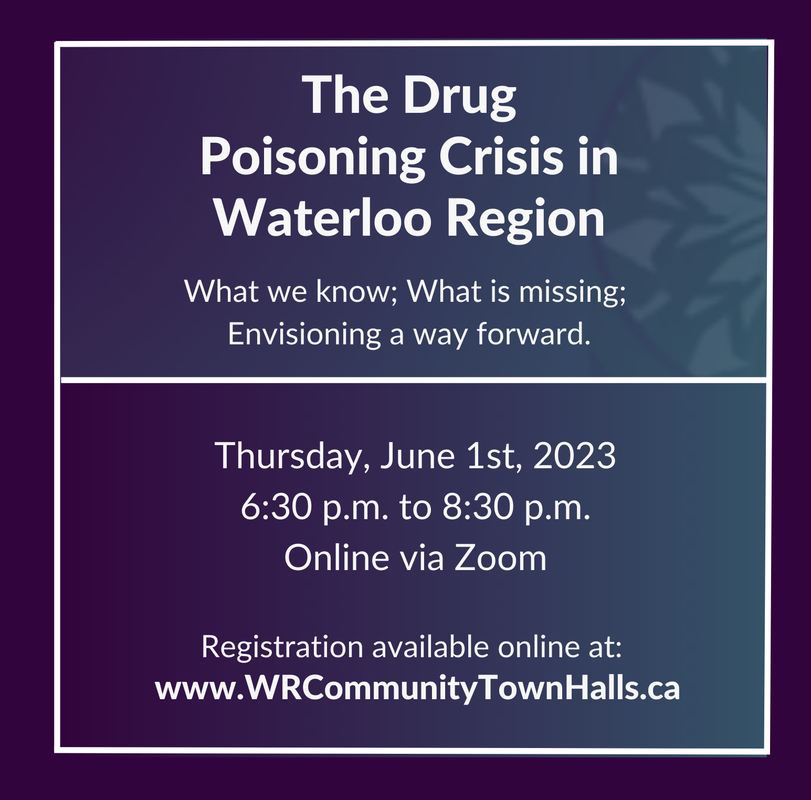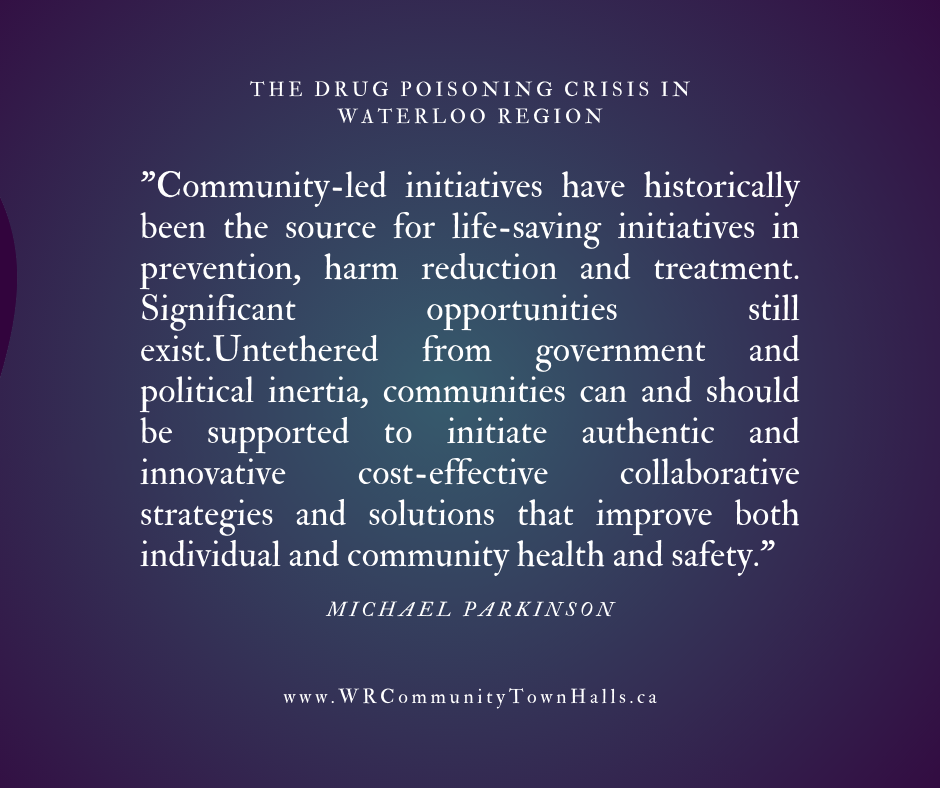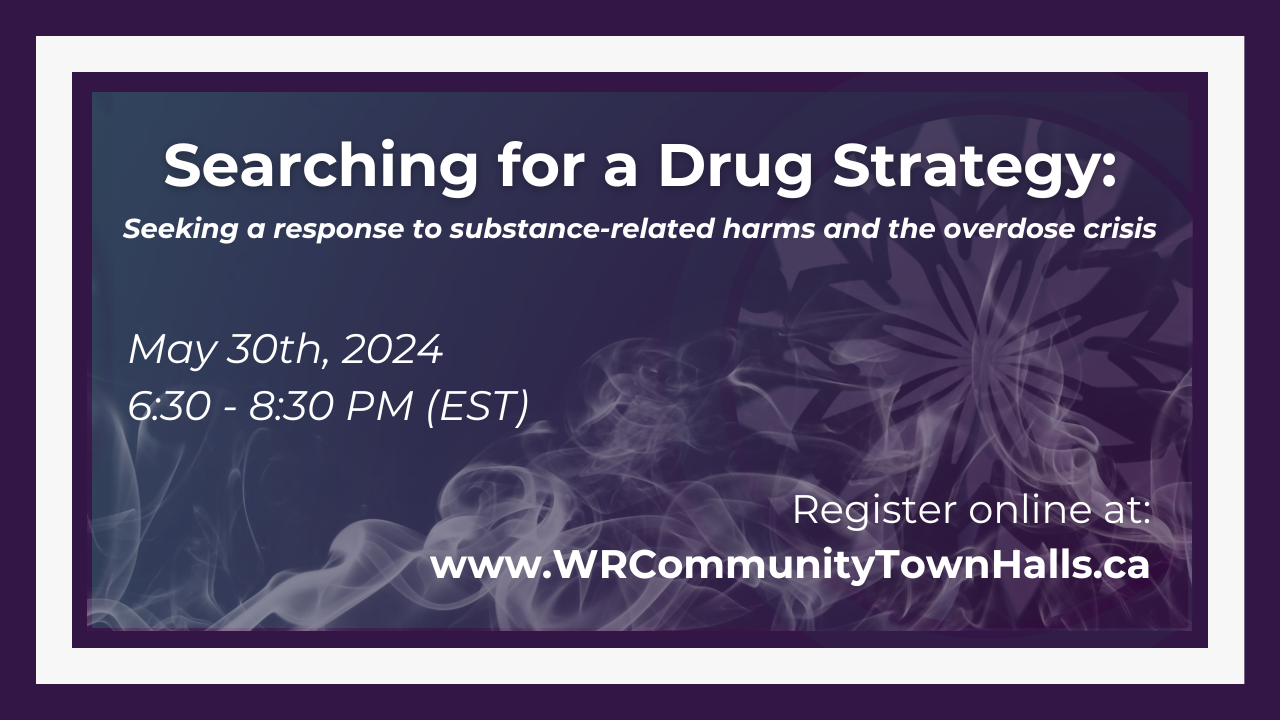Michael Parkinson
Drug Strategies Specialist
|
Michael Parkinson brings experience and some expertise in multi-sectoral human systems engagement, design, and policy planning to advance cost-effective solutions that improve health and safety for both individuals and communities. Michael was most recently employed at the renowned Waterloo Region Crime Prevention Council until it was defunded in 2022, where he advanced issues of (upstream) prevention, community safety initiatives, and a plethora of life-saving drug strategies, programs, laws and policies, at national, provincial, and municipal levels.
|
Preview (Full presentation video can be found below)
|
Presentation & Slides
|
Presentation slides above provided by Michael Parkinson
|
On June 1st, 2023 host Regional Councillor Rob Deutschmann held this virtual conversation focused on Waterloo Region's drug-related crisis.
Expert guest speakers, including Michael Parkinson, outlined key aspects of the drug poisoning crisis we face in Waterloo Region, opportunities to improve our local prevention and response measures, and their visions for a safer and healthier community. |
With his time, Michael expressed deep concern over the state of drug-related issues, which he refers to as a full-scale population-level tragedy, in Canada. There's a lack of effective strategy at all governmental levels, a failing that's driven an escalating crisis in drug poisonings, particularly related to bootleg Fentanyl. This crisis, which began a decade ago, has resulted in numerous preventable deaths, even affecting overall life expectancy in Canada.
Michael focused on the importance of addressing the social determinants of health - conditions related to a person's environment, such as education and income, which can protect against substance abuse and other health issues. Focusing on these factors can not only alleviate the drug crisis but also improve a host of other health, safety, and well-being indicators.
The crisis should be approached scientifically, with evidence-based strategies, rather than letting it become politicized. Pointing to failures in the past, Michael noted that keeping people in hospitals and jails indicates a systemic failure, rather than a success. He highlighted the staggering costs and ineffectiveness of incarcerating drug users, which often results in a cycle of imprisonment without any significant benefit.
Addressing the death toll from overdoses, Michael emphasized that the majority of these are preventable. There is a heavy financial burden of the crisis, estimating it to cost more than $1,200 per person per year in Ontario. He called attention to the stigma and discrimination rooted in historical prohibition laws, suggesting that these laws have often been influenced more by racism and emotion than by evidence.
Finally, Michael urged the development of a community-based strategy to tackle this crisis. He suggested keeping political agendas out of the formulation of the strategy to ensure that it's firmly grounded in scientific evidence. He appealed to his audience to become advocates for a comprehensive approach that prioritizes both individual and community health and safety. He also cautioned against the normalization of political deception and manipulation, which he sees as a threat to democracy and the well-being of society as a whole. He encouraged everyone to speak out and support those in fields like public health, elected officials, or criminal justice, who are sometimes constrained by the politicization of their expertise.
Takeaways
- Address social determinants of health to protect against drug-related problems and a wide range of other health issues.
- Focus on scientifically-informed, evidence-based approaches to the drug crisis. The incarceration of drug users has proven to be both expensive and unsuccessful, demonstrating the need for strategies rooted in scientific evidence.
- Develop a community-based strategy, free from political agendas. Encourage advocacy in support of those working in public health, elected officials, and the criminal justice system.
Robust preventative and mitigating actions from entities with the mandates, protocols, and funding to protect public health and safety remain elusive for the worst drug poisoning crisis in Canadian history. Antiquated notions of who amongst us is worthy of prevention and protection fuel dangerous policy choices with little to no discernible public benefits. After 115 years of narcotic laws with scant evidence of health and safety benefits, there remains much political-structural enthusiasm for subsidizing and enforcing an unregulated, untaxed, unsafe, and unhealthy drug market known to kill and injure thousands of people annually, among a multitude of other human, environmental, public and private sector financial harms
|
Community-led initiatives have historically been the source for life-saving initiatives in prevention, harm reduction and treatment. Significant opportunities still exist. Untethered from government and political inertia, communities can and should be supported to initiate authentic and innovative cost-effective collaborative strategies and solutions that improve both individual and community health and safety.
- Michael Parkinson, Drug Strategies Specialist |



